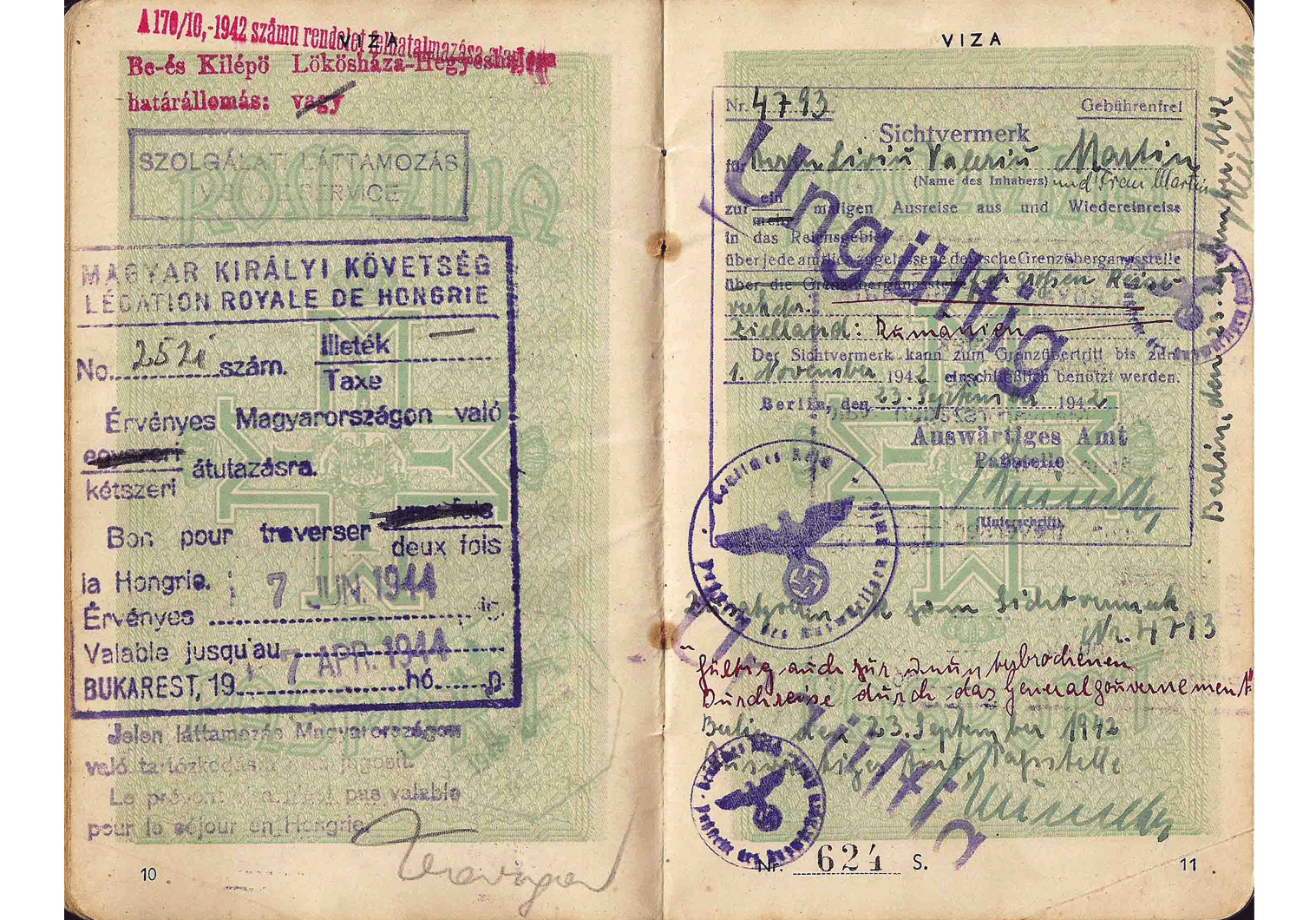WW2 Romanian Service passport
Issued to an official war correspondent with Mihai Antonescu’s signature.
The item here is interesting and a rarity when it comes to passport collecting.
Issued in Bucharest on May 27th 1942 to Livin Valerin Martin, who was an official correspondent for the Romanian National News Agency; known at the time as Rador. The agency was established in 1889 and was called the Telegraphic Agency of Romania and has gone through various changes, both in name and in structure, throughout its history. Its war time name was given to it around 1926, when the parliament voted in allocating it its new name back then. The name changed again in 1949 to AGERPRES.
Special passport No. 624 was issued for the specific purpose of covering the war from Berlin, the heart of Nazi Germany. What makes it even more unique is the fact that it was hand signed personally by Romanian foreign minster Mihai Antonescu .
Some points regarding this individual:
- Born November 18th 1904 – June 1st 1946 (executed);
- Studied law at the University of Bucharest for 4 year (1922-1926);
- Nominated to Propaganda Minister in 1940 to Ion Antonescu’s government;
- From 1941 would enforce anti-Semitic decrees and actions against the county’s Jewish citizens,
- Removed from office on August 23rd 1944;
- Executed for war crimes on June 1st 1946;
His anti-Jewish actions were rather blatant and extreme, such as preventing immigration and legislating anti-Jewish laws; he was also much in control of the domestic affairs of the country and was trying to get closer to Germany, its ally, on the expense of Romania’s Jewish population.
1942 was a the year for which he realized the dire position his country was in due to the setbacks and loses the axis began to suffer, be it in North Africa or the Eastern Front. He would then try to change this by finding ways to remove Romania from the war and once the Soviets won the Battle of Stalingrad on February 2nd 1943, it become clear that the Axis would lose to the Allies. From then onwards he would try to move closer to the United States and Great Britain. He would dismiss and cancel all the anti-Jewish laws and decrees passed earlier on during the war and permit the immigration of Jews to neutral or allied countries, such as British Palestine (1943 and 1944 saw Romanian Jewish immigration to the colony), a move he prevented a short time earlier. Now it was a race against time to try and change the tide and put the country on the winning side. He even went as far as to try and negotiate with Italy’s Mussolini in changing sides, but with no luck. It was also too late by then. Antonescu’s fascist pro-German government was dismissed by King Michael on August 23rd, as the Red Army was nearing the country, and eventually he was handed over to the communist forces, put on trial, and after conviction of war crimes, shot by a firing squad on June 1st 1946 near the fort of Jilava.
The passport was extensively used to travel back and forth from Bucharest to Berlin, with the holder being accompanied by his wife, who was also added into his special passport.
Inside we can find service visas being issued not only by Germany and Romania, but also by other diplomatic legations from Hungary & Slovakia.
He entered Germany again, for the last time, on May 1st 1944 via the Bruck a.d. Leitha border crossing, which back then was part of the Greater Reich but today in Austria.
By July 9th 1945 the Martin’s were already in Rome, where the passport was amended by the Royal Legation in Italy. After several months of staying in the liberated Mediterranean country, he was most likely deported back to Romania around the middle of November, transiting through Turkey on the 19th, entering the country at Constantia on the 21st.
(We can assume he was deported with a group of official Romanian nationals because in a similar service passport, also issued for an official stationed in Germany during the war and ended up in Italy later on, the dates of departure, transit & arrival in Romania are all identical).
I have added sample images of this WW2 passport.
Smaller image source: Wikipedia.
Thank you for reading “Our Passports”.













